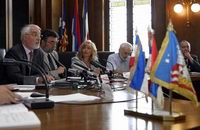- Serbia
Get to know Serbia
- Citizens
Culture and science
Health services
Pension and disability insurance
- Business
Employment
Economy
- Media
- Government
- Contact
Keep in touch
Contact form
Back
Keepin touch
Whether you have a question, comment, suggestion or any problem in the purview of the government, send us your message and we will try to respond as soon as possible. If your problem is not in our purview, we will forward your message to the relevant institution.
Q:
A:
Labus presents Draft Constitution of Serbia
Belgrade,
25 August 2004
Serbian Deputy Prime Minister Miroljub Labus has presented basic solutions from the Draft Constitution of Serbia that the government sent to the parliament in June. Speaking at a panel discussion themed “Position of local self-government in Serbia’s new constitution,” Labus said that the parliamentary committee on constitutional issues will resume the discussion on the Draft in October and that it is very important that Serbia gets a new constitution this autumn.
The Draft defines Serbia as a state of the Serbian people and all the citizens living in it. In the field of human rights, the Draft envisages the introduction of the institutions of ombudsman and constitutional appeal, while in the economic field, it brakes up with the socialist category of social ownership and introduces state ownership and private ownership, which are to be treated equally.
Labus explained that, under a new constitution, natural resources would remain in the state’s hands, while domestic and foreign investors would be allowed to buy land needed for their business, a novelty which removes the existing obstacles to inflow of foreign investment.
The new constitution, according to Labus, would strengthen the position of the President of the Republic, while the government will be “bit weaker than it is today,” because the Draft envisions the introduction of ministers’ individual accountability before parliament.
He also said that the Draft envisions the existence of two provinces, with a possibility that some other territories gain such a status, provided that the parliaments approves it and that it be confirmed through a referendum.
In the field of local government, the new constitution would introduce three types of territorial units – municipality, town, and capital. There would also be a possibility to set up new towns or merge existing municipalities. Local government would have two kinds of incomes – source incomes and those transferred from the republic’s level. Mayors would be elected by municipal assemblies.
The panel, held at the Belgrade City Hall, was organised by the Standing Conference of Towns and Municipalities.
Labus explained that, under a new constitution, natural resources would remain in the state’s hands, while domestic and foreign investors would be allowed to buy land needed for their business, a novelty which removes the existing obstacles to inflow of foreign investment.
The new constitution, according to Labus, would strengthen the position of the President of the Republic, while the government will be “bit weaker than it is today,” because the Draft envisions the introduction of ministers’ individual accountability before parliament.
He also said that the Draft envisions the existence of two provinces, with a possibility that some other territories gain such a status, provided that the parliaments approves it and that it be confirmed through a referendum.
In the field of local government, the new constitution would introduce three types of territorial units – municipality, town, and capital. There would also be a possibility to set up new towns or merge existing municipalities. Local government would have two kinds of incomes – source incomes and those transferred from the republic’s level. Mayors would be elected by municipal assemblies.
The panel, held at the Belgrade City Hall, was organised by the Standing Conference of Towns and Municipalities.
-
 Belgrade, 18 November 2025
Belgrade, 18 November 2025Serbia remains committed to open dialogue, cooperation with OSCE
-
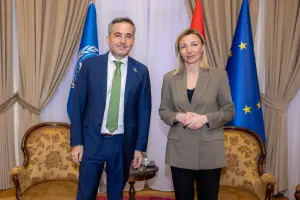 Belgrade, 18 November 2025
Belgrade, 18 November 2025Cooperation with WHO to strengthen protection for victims of violence
-
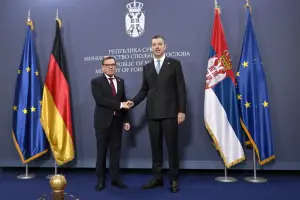 Belgrade, 18 November 2025
Belgrade, 18 November 2025Germany ready to accompany Serbia on its path towards EU
-
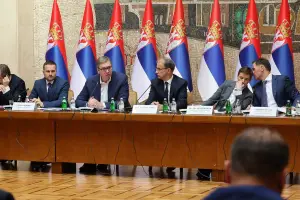 Belgrade, 16 November 2025
Belgrade, 16 November 2025Solution for NIS must be found by next week
-
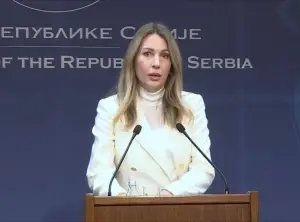 Belgrade, 15 November 2025
Belgrade, 15 November 2025United States sends request for Russian ownership to exit NIS
-
 Belgrade, 13 November 2025
Belgrade, 13 November 2025Serbia continues to be reliable partner of EU
-
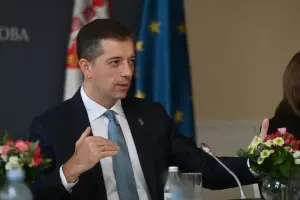 Belgrade, 13 November 2025
Belgrade, 13 November 2025European integration, preserving peace, stability priorities for Serbia
-
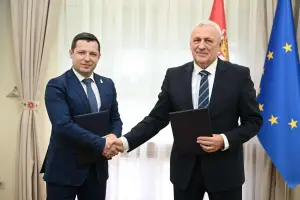 Belgrade, 13 November 2025
Belgrade, 13 November 2025Cooperation agreement signed for preparation of Specialised Expo 2027
-
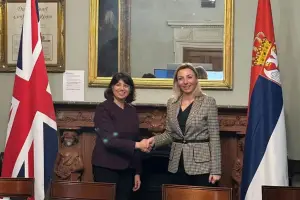 Belgrade/London, 12 November 2025
Belgrade/London, 12 November 2025Exchange of experiences with UK in field of women’s economic empowerment
-
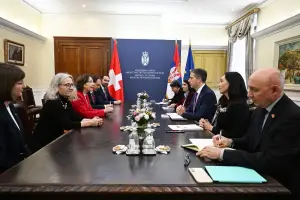 Belgrade, 12 November 2025
Belgrade, 12 November 2025Strengthening cooperation, partnership between Serbia, Switzerland

